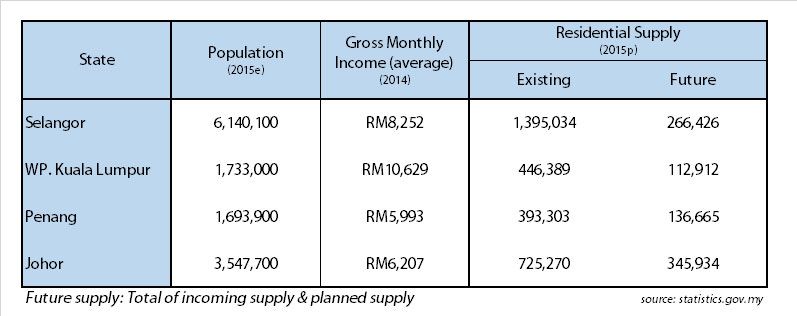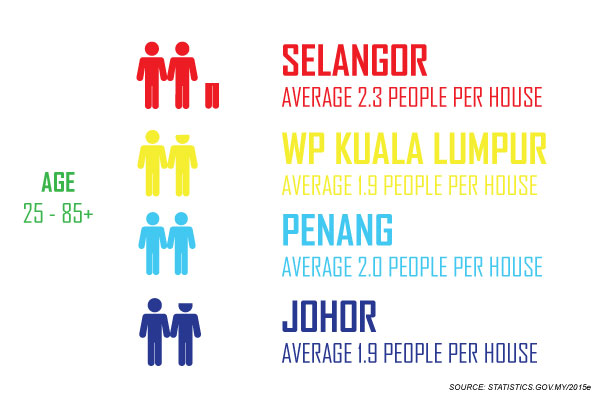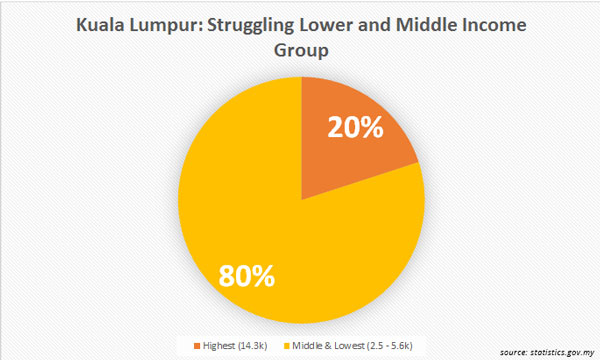The oversupply of properties in Malaysia has become one of the most discussed topic in recent days. We could see newspapers, web portals and even some property experts are suggesting that the properties in Malaysia are oversupply especially in some particular sub-sectors. But is it true that the properties in Malaysia really oversupply? Not sure if anyone actually covered this before but it would be worthwhile to take an approach from different perspective. Now let’s dive into it.

In order to determine whether there is oversupply of properties in Malaysia, we start by looking into a bigger picture. Instead of analysing all states in Malaysia, we take cities that are most active and growing, which are none other than the state of Selangor, Kuala Lumpur, Penang and Johor. The population in Malaysia is estimated about 31 million (as of 2015 estimates). These four states alone accounted for 13.1 million (42.3%) of Malaysia&’s population.
Existing Supply - Existing inventory (stock) are units that have been issued with the certificate of completion and compliance (CCC) prior to the review period plus units completed and issued with CCC within the review period. - JPPH
Back to the ultimate question, is it really oversupply? Well, based on the data gathered for both existing supply and future supply (disregard to the type of residential properties whether they are stratified or landed and population age between 0 - 24 is excluded), it looks like the supply is adequate.

No Significant Sign of Oversupply
Assuming the age group of 0 - 24 could not afford to buy a house and are living with their families, on average there are two people looking to buy one same property. A quick glance into this, there should be insufficient supply to meet the demand. But why the market sentiment tells us otherwise? And many property developers have more than 20% unsold units. Let&’s crunch the numbers again;
Besides Location, Location, Location - There is Something Called - Affordability

In order to understand why there are many unsold units (some perceived as oversupply stocks), we need to examine the income of average household. Throughout Malaysia, especially in these four cities, the average middle and low income group accounted for 80% of the population. Ranging from RM2.5k - RM5.7k gross income per month. The remaining 20% of high income group earns about RM14k gross income per month. If we look into the income of middle and lowest group, can they afford a property?
The Struggles in the City
Let’s do a simple math on a typical property in Kuala Lumpur:

A monthly repayment for typical 945 sq.ft. property in Kuala Lumpur is RM3,112.31 for the next 30 years. The lower income group with average gross monthly income of RM2.5k could not possibly able to buy such property. The middle income group with their gross income of RM5.6k per month, can barely afford to buy a property in Kuala Lumpur after all deductions such as EPF and PCB. That assume if the middle income group has no other expenses such as car loan, personal insurance, etc. A total of 1.38 million out of 1.73 million people living in Kuala Lumpur could not afford to buy a property (for a typical type and price).
A Shortage of Affordable Housing
We have covered this before in our previous article 2020 The Year of Affordable Homes and Rental Income?
The reason is simply because the location itself is not self-sustainable. When there is no jobs around, people tend to move away or prefer to rent in the city so that they could stay nearer to work place. When the demand is not there thus causing oversupply.
The other reasons why these properties are not consumed is due to slow income growth against inflation. The cost of living in the cities is increasing year by year but income has not. The impact of government tax on the people causing lesser disposable income to be spent.
Disclaimer: This article is written based on personal opinion, general view and available information on property market and does not reflect to actual market and consumer behaviour.
「If this article is useful to you, feel free to buy me a coffee ☕」
If this article is useful to you, feel free to buy me a coffee ☕

